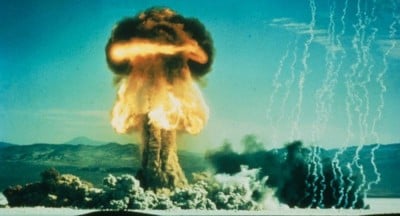Dangerous Crossroads: “This is Not a New Cold War …. Nobody Will Win World War III”
Interview with Michel Chossuodovsky

Russia insists its relations with NATO will not improve unless the western military alliance adopts a new policy toward it.
Russia’s envoy to NATO, Alexander Grushko, says no one should expect a breakthrough in diplomatic relations when representatives from the two sides meet in Brussels later this month. It will be their first meeting since the Ukraine crisis.
Interview with professor Michel Chossudovsky
The date of the forum has not been disclosed yet but the agenda includes the implementation of the ceasefire deal in Ukraine, known as “Minsk-2”, NATO’s military activity and Afghanistan.
The western military alliance has made it clear that any meeting with Russia will have to address the conflict between Ukrainian government forces and pro-Russian fighters in eastern Ukraine.
TRANSCRPT
Press TV has interviewed Michel Chossudovsky, member of Center for Research on Globalization and author of ‘The Globalization of War, America’s Long War against Humanity’, to discuss Russia’s relations with the North Atlantic Treaty Organization (NATO).
The following is a rough transcription of the interview.
Press TV: In your opinion and given your extensive investigations on the issue at hand, what is the crux of the problem?
Chossudovsky: Well the crux of the problem is that we are at very dangerous crossroads in terms of strategic, geopolitical relations and of course warfare and this is not what we might describe a new Cold War because the Cold War had some safeguards with regard to nuclear weapons. There was dialogue, there was consultation and what is happening in recent years is the breakdown of communication, East-West communication. It is coupled with what we might describe as the globalization of NATO, in other words NATO is extending its grip beyond the so-called Atlantic region. It has a military agenda which is one of conquest, it states that it is a defensive agreement but in fact its actions on Russia’s borders are in fact of an aggressive nature and we have various areas of potential confrontation that are not limited to the Ukraine.
We have now the issue in southeastern Europe with confrontation between Armenia and Azerbaijan which is also on Russia’s doorstep, we have the issue of sanctions, we have also the issue of maritime routes, the confrontation between the United States and China in the South China Sea, bearing in mind that China and Russia [are] allies under the Shanghai Cooperation Organization (SCO) and then we also have the situation in the Middle East in particular in Iraq and Syria which in effect is a war of stealth between Russia and NATO.
And … about the war on terrorism, we know that the war on terrorism is bogus and that the only effective force which is fighting the terrorists is in fact the Syrian government forces together with the support of Russia, Iran and Hezbollah and that the United States and its allies, and that includes NATO, are covertly supporting terrorist organizations and in fact NATO right from the outset in 2011 in liaison with the Turkish high command has been involved in the recruitment of foreign fighters to join the ranks of the al-Qaeda affiliated opposition in the Syrian war.
Press TV: In your opinion, what are the dynamics behind this, let’s say, expansion of Russian influence throughout the region not just in Europe but also in the Middle East region which you just touched on?
Chossudovsky: Well I think certainly Russia is playing a different role. First of all it has military capabilities which the Western military alliance has to take account of, and it is both in terms of strategic and conventional forces, but I think the problem is that the people who are making decisions particularly within the US governmental apparatus and NATO, first of all they have very little understanding of military issues, they are civilians and they are not aware of the impacts, let’s say of the use of a tactical nuclear weapon. Ninety of those tactical nuclear weapons are stored in Incirlik in Turkey and they are under Turkish command. They are designated as harmless to the surrounding civilian population in Pentagon documents which is absolutely nonsensical. They have an explosive capacity between one-third and six times Hiroshima bomb, and then Hillary Clinton says nuclear weapons are on the table.
So that when we have that kind of discourse where people in very high levels of government are making statements that actually point towards a World War III scenario, we are at a very dangerous crossroads and I think we have to hope that some people within that political spectrum of Western leaders will start to see that building a relationship with Russia and China to avoid military confrontation is ultimately the solution because World War III is terminal. We cannot get into that debate but World war III is not an option and the United States will not win World War III. Nobody will win World War III.

